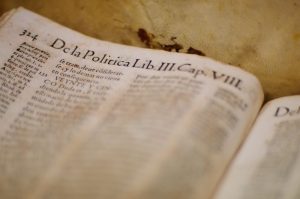Las fuentes textuales de la Temprana Edad Moderna plantean desafíos específicos con respecto a su adquisición, análisis y representación digital. En primer lugar, la digitalización de fuentes de textos completos es compleja, requiere mucho tiempo y está lejos de ser un proceso completamente automatizable, al menos de modo que pueda alcanzar a satisfacer las necesidades de los investigadores académicos. En segundo lugar, el análisis digital de datos se basa en modelos de datos históricos y textuales específicos y en ontologías que deben llevarse a cabo mediante el estudio académico y la anotación manual de los textos, lo cual requiere mucho tiempo. Por otro lado, las aplicaciones automáticas enfrentan una importante escasez de 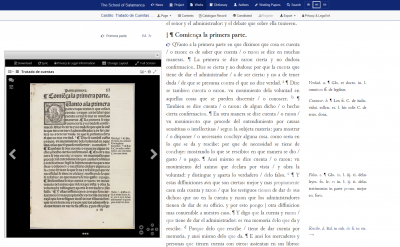 herramientas de procesamiento de lenguaje natural aplicables a idiomas de «bajos recursos» como el español o el latín de la Primera Modernidad, careciendo también de recursos lingüísticos y semánticos apropiados para estos períodos e idiomas específicos. Finalmente, aunque las discusiones sobre representaciones de datos (textuales) y visualizaciones se encuentran en el centro de los esfuerzos actuales de las humanidades digitales, todavía no existe un consenso mínimo acerca de cuáles sean las mejores prácticas para representar los textos e informaciones específicas de la Modernidad Temprana en su compleja variedad (multimedial / multimodal). Estas dudas se extienden tanto a las formas digitales a emplear, como a sus versiones, formas de participación lectora, arquitecturas de programas subyacentes, etc.
herramientas de procesamiento de lenguaje natural aplicables a idiomas de «bajos recursos» como el español o el latín de la Primera Modernidad, careciendo también de recursos lingüísticos y semánticos apropiados para estos períodos e idiomas específicos. Finalmente, aunque las discusiones sobre representaciones de datos (textuales) y visualizaciones se encuentran en el centro de los esfuerzos actuales de las humanidades digitales, todavía no existe un consenso mínimo acerca de cuáles sean las mejores prácticas para representar los textos e informaciones específicas de la Modernidad Temprana en su compleja variedad (multimedial / multimodal). Estas dudas se extienden tanto a las formas digitales a emplear, como a sus versiones, formas de participación lectora, arquitecturas de programas subyacentes, etc.
Algunos de los métodos e infraestructuras desarrollados para responder a estos desafíos son bien conocidos. Por ejemplo, la adquisición de datos (textos) históricos puede mejorarse a través de formas de colaboración abierta distribuida (crowdsourcing) y edición digital colaborativa y técnicamente facilitada por herramientas de anotación colaborativas; los modelos de datos abiertos vinculados y las infraestructuras relacionadas pretenden, a su vez, proporcionar medios para anotar los datos de modo que se ajusten a los estándares interoperables de la web semántica. Asimismo, hay una cantidad cada vez mayor de recursos lingüísticos y geográficos específicos, así como de herramientas adaptadas por y para proyectos individuales de investigación sobre la Modernidad. Estos proyectos podrían beneficiarse potencialmente a través de la comunicación y el intercambio de recursos y herramientas. Con el fin de fortalecer el uso comunitario de marcos y herramientas ya existentes, y de compartir métodos y herramientas que hasta ahora eran desconocidos -con excepción de algunos casos puntuales-, parece crucial proponer un intercambio de conocimientos teóricos, metodológicos y prácticos acerca de los planteamientos digitales que barajan los proyectos de investigación sobre la Primera Modernidad.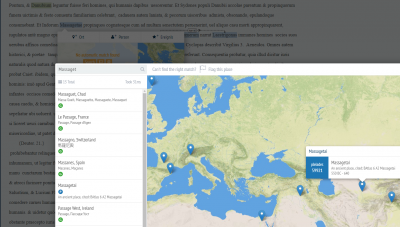
Con la intención de fomentar este intercambio interdisciplinario a nivel intercultural, el Instituto Max Planck para la Historia del Derecho Europeo y el proyecto «La Escuela de Salamanca: una colección digital de fuentes y un diccionario de su lenguaje jurídico-político» organizan un taller con expertos en humanidades digitales de América Latina y Europa en el Instituto Max Planck de Argentina – Instituto de Investigación en Biomedicina de Buenos Aires.
El taller incluirá un pequeño número de presentaciones de proyectos individuales y ofrecerá, además, la oportunidad para la discusión conjunta en sesiones dedicadas al trabajo conjunto con herramientas técnicas, métodos y marcos, así como con recursos (lingüísticos, geográficos, ontológicos, etc.) para el estudio de fuentes y contextos modernos tempranos.
Fecha: 23 de Octubre 2018
Lugar: Instituto Max Planck Argentina – Instituto de Investigación en Biomedicina de Buenos Aires, C1425FQD, Godoy Cruz 2390, Buenos Aires
La lengua del taller será el español, aunque contribuciones en inglés también serán posibles.
Para inscribirse como participante en el seminario, contáctenos, por favor, hasta el 15 de octubre de 2018 en: salamanca@rg.mpg.de.
Programa
14:00 Thomas Duve: Bienvenida
14:05 Andreas Wagner / David Glück: Introducción
14:15 Andreas Wagner: Investigación en humanidades digitales relacionada con Iberoamérica en el Instituto Max Planck para la Historia del Derecho Europeo.
14:45 David Glück: Métodos, marcos y recursos lingüísticos en la edición digital de «La Escuela de Salamanca»
15:15 Debate.
15:30 Sesión práctica: Marcos, métodos y herramientas digitales para la historia de la Temprana Edad Moderna.
16:30-17:00 Pausa.
17:00 Gimena del Rio Riande, Romina De León, Nidia Hernández (HD CAICYT Lab, CONICET): Integrando la anotación, herramientas de edición digital y recursos GIS: Experiencias prácticas del proyecto LatAm (presentación del proyecto y sesión práctica).
18:00 Debate.
18:30 Cierre del taller y despedida.
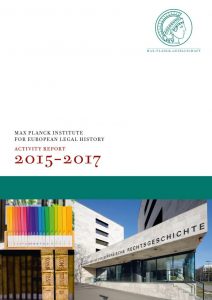
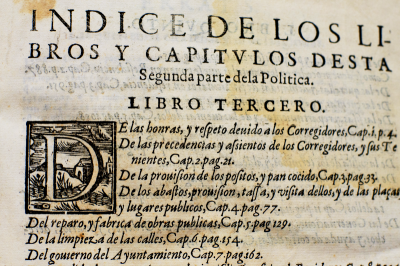
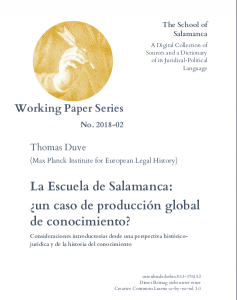
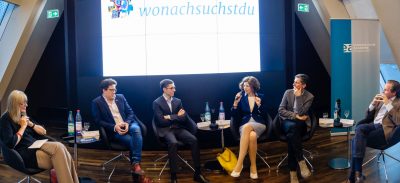 Die Gesprächsrunde war gut aufgelegt, und das Publikum hat viel gelernt – wie man Max-Planck-Direktor wird, was ein Rechtshistoriker eigentlich macht und welche Fragen die Gesprächsteilnehmer schon immer gern mal ihren Kolleginnen und Kollegen gestellt hätten. Das Gespräch ist für hr-info aufgenommen worden und wird zu einem späteren Zeitpunkt im Radio gesendet.
Die Gesprächsrunde war gut aufgelegt, und das Publikum hat viel gelernt – wie man Max-Planck-Direktor wird, was ein Rechtshistoriker eigentlich macht und welche Fragen die Gesprächsteilnehmer schon immer gern mal ihren Kolleginnen und Kollegen gestellt hätten. Das Gespräch ist für hr-info aufgenommen worden und wird zu einem späteren Zeitpunkt im Radio gesendet.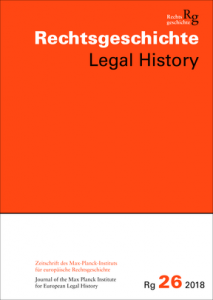
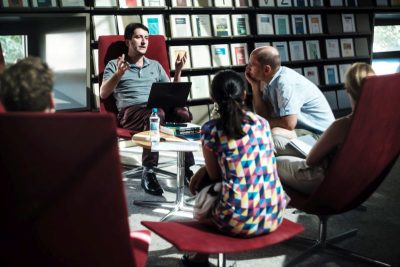
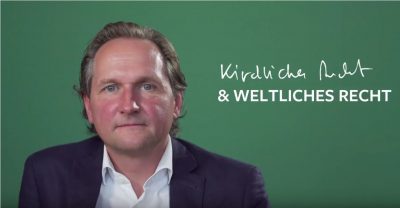 Im Juli dieses Jahres hat unser Projektleiter Thomas Duve einen Ausflug ins Frankfurter Städel-Museum gemacht und über seine Sicht auf ausgewählte Werke dort gesprochen, unter anderem über den „Stammbaum der Dominikaner“ von Hans Holbein d. Ä. Am Beispiel von Johannes Vermeers «Der Geograf» blickt er auf das Delft des 17. Jahrhunderts und die Ausbildung von informellen Imperien. Für alle, die nicht dabei sein konnten, gibt es ein kurzes Video:
Im Juli dieses Jahres hat unser Projektleiter Thomas Duve einen Ausflug ins Frankfurter Städel-Museum gemacht und über seine Sicht auf ausgewählte Werke dort gesprochen, unter anderem über den „Stammbaum der Dominikaner“ von Hans Holbein d. Ä. Am Beispiel von Johannes Vermeers «Der Geograf» blickt er auf das Delft des 17. Jahrhunderts und die Ausbildung von informellen Imperien. Für alle, die nicht dabei sein konnten, gibt es ein kurzes Video: Speaker: Juan Belda Plans [website:
Speaker: Juan Belda Plans [website: 